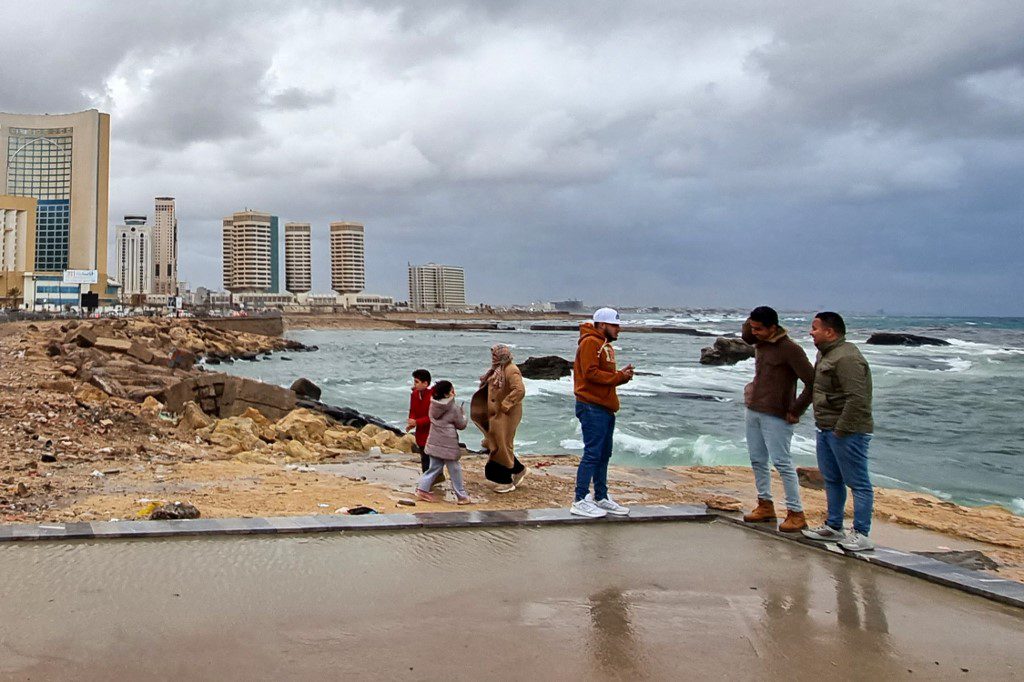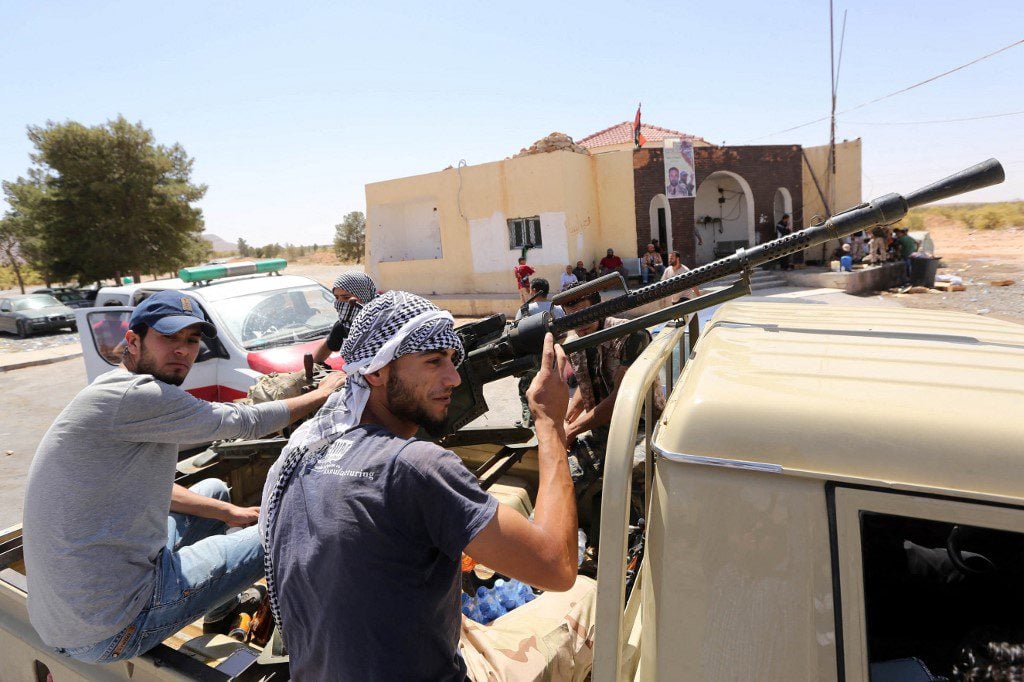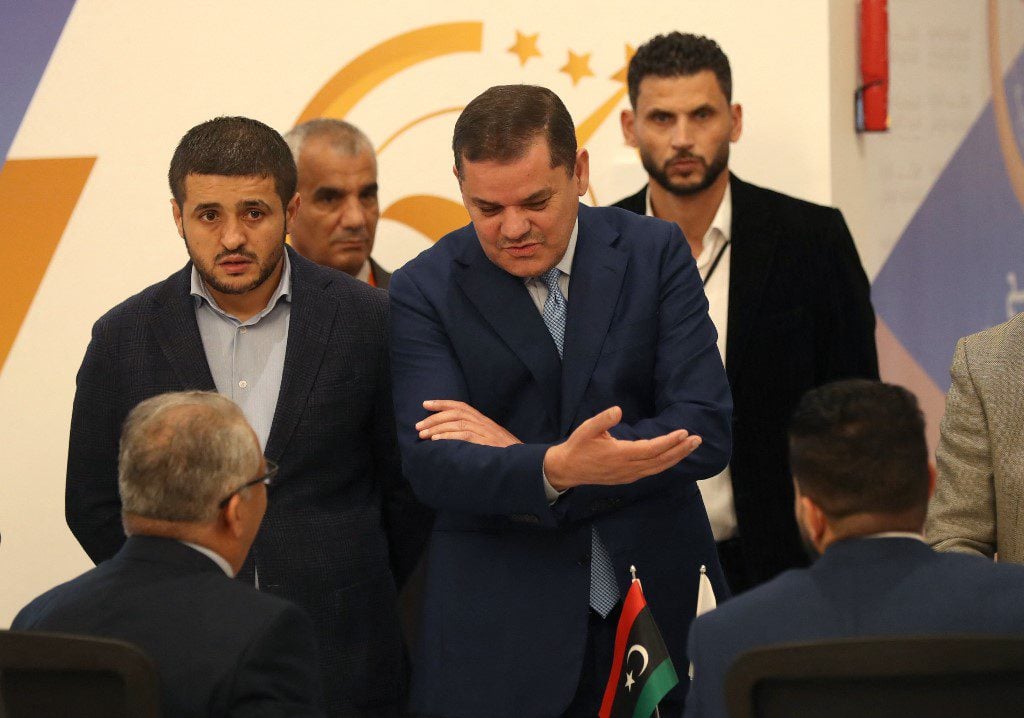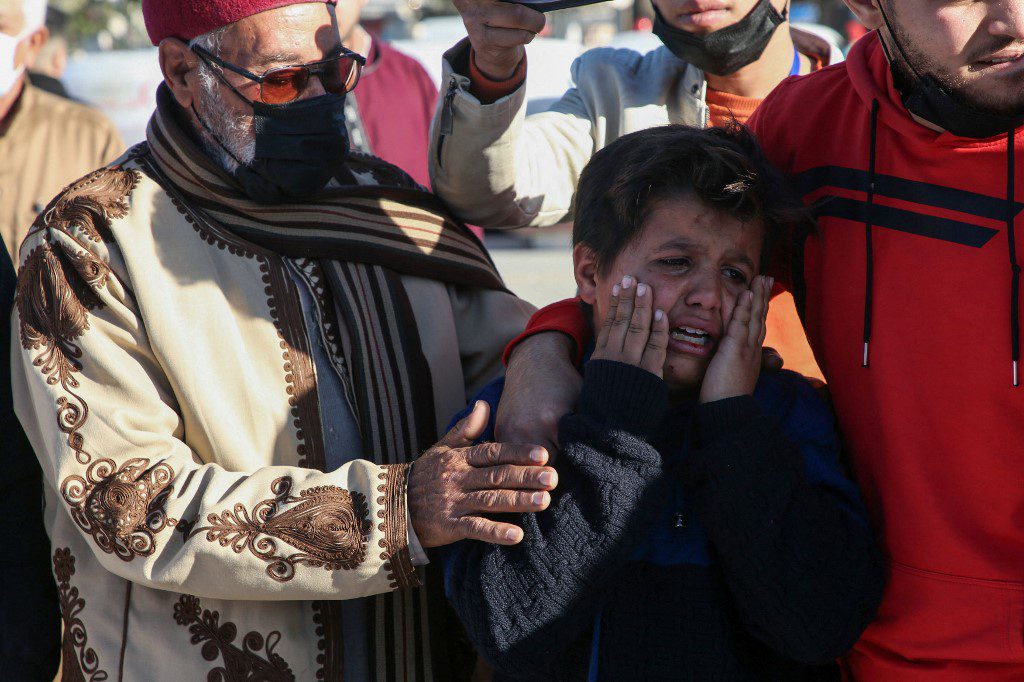
Khaled Mahmoud
The armed militias in the Libyan capital, Tripoli, are planning a new military coup against the transitional authority, including the Presidential Council headed by Mohamed al-Menfi and the unity government led by Abdul Hamid Dbeibeh.
At the same time, Libya remains captive to political and military chaos after the peaceful path was blocked and the presidential and parliamentary elections scheduled for Dec. 24, 2021, were postponed.
Secret Meetings and Suspicious Movements
According to exclusive information to Fanack, Western diplomats in Tripoli monitored several secret meetings in the city and similar meetings in Misrata in the west of the country. The most significant commonality between them is the presence of armed militias leaders affiliated with the two cities.
An Arab diplomat in Tripoli, who asked to remain unknown, said: “There have been military crowds arriving in queues, armoured vehicles and armed elements on the edge of Tripoli for a few days.”
“These movements are occurring in isolation from the transitional authority, and most of its officials are unaware of them, and even if they know, they cannot prevent them or even just openly question them”, he added.
Spokespersons for the Presidential Council and the Unity Government declined to comment on the concerns raised about an expected military coup in Tripoli. On the other hand, officials in the National Army stationed in the east expressed fears of violent battles between the divided militias, whose loyalty is exclusive to their leaders.
According to two sources, one of whom is a media official close to the Menfi and Dbeibeh, and the other is from the United Nations mission to Libya, they (Menfi and Dbeibeh) recently asked Stephanie Williams to increase security measures to protect them.
The United States Africa Command, “AFRICOM”, refused to comment on information about the elements of the US special forces securing the Menfi and Dbeibeh, in addition to their regular duties in securing Williams, the former US diplomat, who recently returned to Libya as a special adviser to the secretary-general of the United Nations.
The Threat of Rebellion
Dbeibeh, the interim prime minister, did not speak publicly about the suspicious movements of the Tripoli militias. Still, in a showboating manner, he did a sudden inspection of the capital’s centre and its most important squares, hours after the appearance of circulating video clips of the spread armed militias on the outskirts and entrances of the capital.
Dbeibeh was accompanied by armed guards, in an implicit message that, contrary to reality, he is still in control of the situation in the city after these moves that transpired without his consent or knowledge, in an undisciplined but expected military behaviour from militia members that do not know military discipline nor the official hierarchy of the regular armies.
It is noteworthy that the cancellation of the elections that were scheduled for Dec. 24, 2021, according to the program of the United Nations Mission and the Libyan Political Dialogue Forum it sponsors in Geneva, meant the victory of the militias’ will, which had previously expressed their rejection of these elections, in a statement issued in early November.
Power of the Militias

The leaders of the armed militias in western Libya imposed their will. They prevented the elections from being held on the pretext that their laws were “legally challenged, and not based on any political consensus,” which prompted the High Electoral Commission to postpone it to the 24th of this month. However, it also will not take place for the same reason: the continuation of the armed militias to disrupt the electoral process.
The behaviour of the militias is the force majeure on which the commission relied in the decision to postpone the elections but without the ability to call things by their proper names, knowing that the commission, in its monitoring of security risks in the elections, considered in a report published on its official website that the presence of non-state armed elements is among the external risk factors.
But this was not the first time that the militias succeeded in imposing their policy. A statement signed by 12-armed militia leaders a few weeks ago held Menfi and his Presidential Council as the supreme commander of the Libyan Army, and Dbeibeh as the minister of defence in the unity government that he heads, responsible for the consequences of the recent decision to dismiss Major General Abdel Baset Marwan from his position as commander of the Tripoli Military District.
The threatening tone revealed by the statement, which the signatories described themselves as leaders of the security services inside Tripoli, included signs of a military rebellion that these militias would implement if Menfi and Dbeibeh ignored their demands, which later prompted them to freeze the decision to dismiss Marwan, considering it as if it had not happened.
Among the signatories to the statement are the Tripoli Brigade, the Eighth Battalion (Al-Nawasi), the Deterrence Agency, the 42nd Infantry Brigade, Abu Salim Brigade, the Joint Operations Room, the Public and Central Security Agency, Al-Shahida Brigade, the Fourth Force Commander, the Ain Zara axis, the head of the Central Support Office, and the Fursan Janzour Brigade.
These military and security entities receive their funding from the Presidential Council and the Unity Government, knowing that they were also the same entities supporting the previous Government of National Accord headed by Fayez al-Sarraj.
Badi Outlines the Coup Features
Simultaneously, Salah Badi, the commander of the Al-Samoud Brigade, whose affiliated with Misrata, sanctioned locally and internationally, returned to escalate the situation against the transitional authority in the country by publicly inciting a group of brigades leaders he met in Misrata to expedite the implementation of a military coup, saying: “You must go immediately to the capital to expel the traitors of the Feb. 17 revolution”.
In the same meeting, Badi outlined the features and method of this coup and claimed that an agreement would be reached to cancel the elections, form a ruling revolutionary military council to run the country’s affairs, and approve a constitution that prevents criminals from running.
He said that the forces of Misrata were the ones who brought down later deposed Libyan President Moammar Gaddafi, and those who control the scene today are his supporters, trying to restore the idol because they are used to slavery.
Dbeibeh Funds Armed Militias

Dbeibeh continues to provide armed militias with a significant share of the Libyan state budget. Although he took office only in March 2021, hardly a month had passed without Dbeibeh swiping a bank check to neutralise the lawless armed militias he inherited from the Sarraj government.
The militias behaviour as if they were a state outside the state, their increasing influence, despite their involvement in many war crimes against civilians over the 10 years that followed overthrowing Gaddafi’s regime in 2011, raises questions about this abomination of a marriage between the executive authority and these militias that do not recognise the existence of the state, to begin with.
In his efforts to arrange his papers and form military alliances on the ground to ensure his presence on the scene, Dbeibeh ignored the recommendations of the Libyan Military Commission (5+5) to reintegrate more than eight armed entities in western Libya and transfer their subordination to the Chieftain of the General Staff and the Ministry of Interior.
The commission noted several armed groups assigned tasks or granted overlapping special military and security authorities without setting clear limits on their duties and tasks. The commission considered that this led to the destabilisation and weakness in the performance of the military and security institutions, which is the most dangerous thing that the two institutions could suffer.
The commission named nine security and military apparatus loyal to the Unity Government and recommended reconsidering these groups’ subordination and drawing up their financial budget under the supervision of the General Staff and the Ministry of Interior and not independently.
A New Military Entity
However, at the meeting of the armed militias’ leaders in Jadu in the Western mountains on Monday, Jan. 10, 2022, they officially announced the inauguration of a new military entity named the Union of Military Councils.
The union, which announced in a statement carried by the official Libyan News Agency, its subordination to the transitional authority represented by the Ministry of Defense of the Unity Government and the General Staff of the forces loyal to it, and claimed its support for the military institution, quickly revealed its true colours, according to Ahmed Ikhlef, head of the Jadu Military Council, who told the Anadolu Agency: “We came from all of Libya to establish an entity to protect the revolutionaries. The revolutionaries must have a body that protects them”.
After advising groups to resort to the military councils, Ikhlef considered that this step represented a resumption of the central and fundamental nucleus of the Feb. 17 revolution.
On Jan. 8, upon meeting with the head and members of a government committee concerned with organising, including and integrating armed militias, Dbeibeh praised the work of this committee, which does not bear a name, but merely a number (410), and the term used was changed to include and integrate young people instead of militias.
At the meeting, Dbeibeh discussed facilitating the procedures for including this category and fully assimilating it into real and practical projects. He also recommended the necessity of finding practical and real projects for this segment, which he considered the backbone of a civil state.
This traditional lip service, which is devoid of any actual reference to the numbers required to be absorbed or the budget allocated for that and the period for its achievement, is not new at all. More than three months have passed since the inauguration of the so-called National Project for Rehabilitation and Reintegration under the auspices of the Ministry of Labour to integrate the youth enrolled under armed militias and those wishing to join various state institutions, without any progress.
On the other hand, the National Army, through its Director of the Moral Guidance Department Major General Khaled al-Mahjoub, vowed “divine revenge” after accusing Dbeibeh of starving the army forces through withholding their salaries for the fourth month in a row.
In an elegy for the state of affairs, Mahjoub concluded that Dbeibeh “has been morally bankrupt, his scandals multiplied, his truth emerged, and he turned into a tool to starve Libyans”.
In their last meeting in Sirte, Muhammad al-Haddad, Chief of Staff of the Unity Government Forces, and Lieutenant-General Abdul Razzaq al-Nadori, Chief of Staff of the National Army and its designated commander, agreed to form joint committees to study the unification of the military institution, in addition to developing a comprehensive plan to organise and accommodate the armed formations.
The Militias Army Headcount

There are no official statistics about the number of armed militia members in western Libya. Still, there are estimates that the number registered in the lists of dozens of militias that are nominally under the control of the state exceeds more than a quarter of a million, which is a considerable number for the population of nearly 7 million people.
The powerful and armed militias do not agree and constantly struggle over areas of influence and control. They have always resisted all official and governmental attempts to persuade or force them to give up their arms and join an organised army.
Successive governments in Tripoli sought to absorb some of the thousands of former fighters by including some of them on the state’s wage lists, which led to a mixture of security forces and semi-official military units in a way that reinforced the myth of armed militias.
The former rebel and armed groups adhere to managing their interests, the affairs of their elements, and their vast budget, away from the eyes of any monitoring authority and not subject to any military or security hierarchy.
These armed elements do not show any willingness to give up their arms or line up behind a government, except to get more money.
Most of the militia leaders appeared on the media screens and photographers’ lenses, sitting at the same table with Menfi and Dbeibeh, the same scene that the Libyans have become used to since the fall of the Gaddafi regime until now.
Most of the militias are funded by the state, and millions of dollars have been spent from budget allocations to equip them to be the country’s army. Still, in return, they are implicated in committing war crimes and human rights violations, in addition to their involvement in smuggling weapons, drugs and refugees.
Perhaps this is what prompted Amnesty International to call on the Libyan authorities, in a statement via Twitter, to release hundreds of asylum seekers and migrants after the militias arbitrarily arrested them in Tripoli, repeating what it had previously pointed out in a report issued in October 2021, regarding the use of unlawful lethal force and other types of violence by security forces and armed militias in Tripoli in the unprecedented arrests of more than 5,000 men, women and children from sub-Saharan Africa, and their detention in horrendous conditions where torture and sexual abuse are rampant.
The Painful Reality
While the US administration, through its embassy in Libya and the United Nations Mission, continues its relentless efforts to achieve a missing consensus between the House of Representatives and the High Council of State on the laws regulating the electoral process, the near future does not bear any indication that the Libyans will any time soon realise their dream of electing their next president in a secure and stable environment, at the expense of the armed militias, which are preparing to swallow up the transitional authority again and subjugate it, as it did with its counterparts and predecessors in the past.
According to the Geneva Dialogue Forum, Stephanie Williams is racing against time that threatens the legitimacy of the transitional authority by next June, considering that it is the end of this period.
In Williams’ view, Libya’s national institutions are facing a crisis targeting their legitimacy that can only be resolved through elections that are meant to be held by this date, in a new relay of the electoral due date.
This file reflects the depth of the crisis suffered by the Libyans until now, given that the curse of this oil state lies in its armed militias. But it seems that its stability remains between the jaws of chaos and raging civil war, since its fall in 2011 and for an entire decade.
Libya’s stability remains a fantasy and mere wishes that collide with its painful reality.


